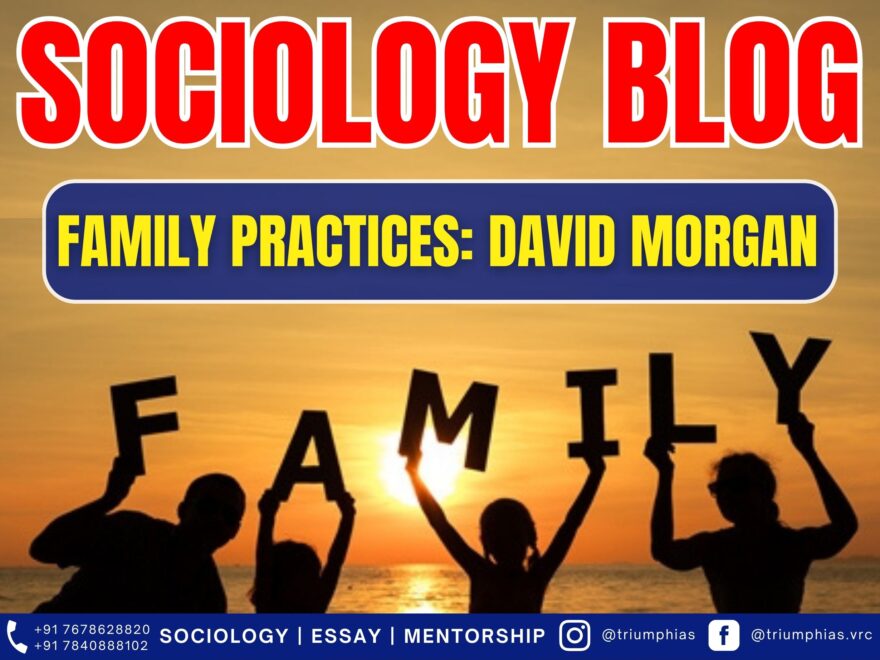Family Practices: David Morgan Sociology Perspective
(Relevant for Sociology Optional for Civil Services Examination)
Paper-1 Unit-9 Systems of kinship
Paper-2 Unit-12 Social Structure; Systems of kinship in India

David Morgan, a renowned sociologist, has contributed significantly to our understanding of family practices and their broader implications for society. In this blog, we delve deep into Morgan’s views on family practices, exploring how they shape our relationships, redefine intimacy, and impact gender roles within the family. We also examine critical perspectives that challenge his conceptualization and propose alternative approaches. Join us on this sociological journey to uncover the intricacies of family practices.
David Morgan’s Concept of Family Practices
According to David Morgan, family practices encompass the everyday actions that family members undertake with the intention of affecting one another. These practices can range from simple conversations to more complex interactions. Let’s take the example of “family talk.” Within families, much of the talk occurs with shared assumptions and references to past experiences. This type of communication reaffirms the family relationship and its significance. Essentially, family practices and family relationships engage in a complex, improvised dance, where actions speak louder than words.
Gender and Societal Dynamics
Morgan’s work also sheds light on the role of family practices in shaping gendered individuals and societies. He emphasizes the reciprocal relationship between family life and the social context of the time and place. This cross-disciplinary perspective challenges traditional notions of ‘rationality’ and ‘relatedness.’ In the UK, scholars have expanded upon Morgan’s concept of ‘family practices’ by introducing the idea of ‘displaying family.’ However, as we’ll see, not everyone agrees with this perspective.
A Critical Perspective: Roseneil’s Argument
Roseneil argues that referring to family practices as such can be limiting. She believes that this approach reproduces heteronormative models of human relationships and fails to account for the diverse ways individuals live their lives. This criticism prompts us to explore alternative viewpoints.
Beyond the Nuclear Family Model
Several scholars have attempted to move beyond the nuclear family model in their understanding of family practices. One such approach emphasizes intimacy in relationships. Lynn Jamieson’s work, for instance, highlights “disclosing intimacy” as an intimate connection of the self, distinct from physical intimacy. While this approach still overlaps with family relationships, it questions whether we should use a broader term like ‘intimate practices’ instead of the narrow ‘family practices.’
Jacqui Gabb’s research on intimacy in families demonstrates how ‘practices of intimacy’ intersect with and influence our understanding of ‘family practices.’ These practices involve making sense of the body, embodiment, and bodily interactions within families.
Personal Life Approach: Carol Smart
Carol Smart’s personal life approach to family practices extends beyond traditional boundaries. She explores a wide range of family and kinship relationships, including same-sex relationships and friendships. This approach highlights the fluidity and complexity of modern family dynamics.
Configurational Approach by Eric D. Widmer
Eric D. Widmer’s configurational approach takes a broader view of family practices. It doesn’t limit itself exclusively to family or family-type relationships but considers all chains of relationships and inter-dependencies within society. This perspective opens up new avenues for sociological exploration.
Caringscapes Approach
The caringscapes approach, advocated by scholars McKie, Gregory, and Bowlby, focuses on the gendered interface between home and work. It examines the practices mothers adopt to maintain care for their children and other family members while remaining in paid employment. Care is a fundamental set of practices, and this approach challenges the conventional association of care with the family. It highlights the gendered nature of care and its diverse settings, which can include clinics, nursery schools, or sheltered housing. The ‘caringscapes’ approach broadens our understanding of family practices within a larger societal context.
The Total Social Organisation of Labour (TSOL)
Miriam Glucksmann’s concept of ‘The Total Social Organisation of Labour’ (TSOL) offers a radical departure from traditional family practice theories. It focuses on activities that link and cross various domains such as workplaces, households, state institutions, and communities. For instance, children’s education connects home, school, state, and community, intersected by social divisions like class and gender. The TSOL operates in areas where family practices overlap with societal dynamics, such as workplace flexibility and family-friendly policies.
Challenges and Expansions
Despite some limitations, David Morgan’s conceptualization of family practices has had a profound impact on the field of sociology. His work spans a wide range of topics, from acquaintanceship and friendship to family, kinship, and gender issues. Researchers have applied his ideas to challenging circumstances, including seeking asylum, long-distance relationships, post-divorce family dynamics, and single-parent struggles during the pandemic.
Conclusion
David Morgan’s perspectives on family practices have enriched our understanding of the intricate dance that occurs within families and their broader societal context. Whether we agree with his views or explore alternative approaches, his work remains a cornerstone in the study of family dynamics in contemporary society.
As you prepare for your sociology optional UPSC examination, remember to consider the diverse viewpoints and approaches within the field. The concept of family practices is continually evolving, and your understanding of these perspectives will serve you well in the exam.
Related Blogs …
To master these intricacies and fare well in the Sociology Optional Syllabus, aspiring sociologists might benefit from guidance by the Best Sociology Optional Teacher and participation in the Best Sociology Optional Coaching. These avenues provide comprehensive assistance, ensuring a solid understanding of sociology’s diverse methodologies and techniques.
META TAGS:
David Morgan, family practices, family practices upsc, family practices sociology, family practices in India, sociology, intimacy, care, relationships, kinship, gender issues, Total Social Organisation of Labour, caringscapes approach, family practices upsc, family practices sociology, family practices upsc,
Why Vikash Ranjan’s Classes for Sociology?
Proper guidance and assistance are required to learn the skill of interlinking current happenings with the conventional topics. VIKASH RANJAN SIR at TRIUMPH IAS guides students according to the Recent Trends of UPSC, making him the Best Sociology Teacher for Sociology Optional UPSC.
At Triumph IAS, the Best Sociology Optional Coaching platform, we not only provide the best study material and applied classes for Sociology for IAS but also conduct regular assignments and class tests to assess candidates’ writing skills and understanding of the subject.
Choose The Best Sociology Optional Teacher for IAS Preparation?
At the beginning of the journey for Civil Services Examination preparation, many students face a pivotal decision – selecting their optional subject. Questions such as “which optional subject is the best?” and “which optional subject is the most scoring?” frequently come to mind. Choosing the right optional subject, like choosing the best sociology optional teacher, is a subjective yet vital step that requires a thoughtful decision based on facts. A misstep in this crucial decision can indeed prove disastrous.
Ever since the exam pattern was revamped in 2013, the UPSC has eliminated the need for a second optional subject. Now, candidates have to choose only one optional subject for the UPSC Mains, which has two papers of 250 marks each. One of the compelling choices for many has been the sociology optional. However, it’s strongly advised to decide on your optional subject for mains well ahead of time to get sufficient time to complete the syllabus. After all, most students score similarly in General Studies Papers; it’s the score in the optional subject & essay that contributes significantly to the final selection.
“A sound strategy does not rely solely on the popular
Opinion of toppers or famous YouTubers cum teachers.”
It requires understanding one’s ability, interest, and the relevance of the subject, not just for the exam but also for life in general. Hence, when selecting the best sociology teacher, one must consider the usefulness of sociology optional coaching in General Studies, Essay, and Personality Test.
The choice of the optional subject should be based on objective criteria, such as the nature, scope, and size of the syllabus, uniformity and stability in the question pattern, relevance of the syllabic content in daily life in society, and the availability of study material and guidance. For example, choosing the best sociology optional coaching can ensure access to top-quality study materials and experienced teachers. Always remember, the approach of the UPSC optional subject differs from your academic studies of subjects. Therefore, before settling for sociology optional, you need to analyze the syllabus, previous years’ pattern, subject requirements (be it ideal, visionary, numerical, conceptual theoretical), and your comfort level with the subject.
This decision marks a critical point in your UPSC – CSE journey, potentially determining your success in a career in IAS/Civil Services. Therefore, it’s crucial to choose wisely, whether it’s the optional subject or the best sociology optional teacher. Always base your decision on accurate facts, and never let your emotional biases guide your choices. After all, the search for the best sociology optional coaching is about finding the perfect fit for your unique academic needs and aspirations.
Follow us :
🔎 https://www.instagram.com/triumphias
🔎https://www.youtube.com/c/TriumphIAS
https://t.me/VikashRanjanSociology
Find More Blogs…
| Compare and contrast Karl Marx’s and Max weber’s | Karl Marx- Historical Materialism |
| Talcott Parsons : Social system | Scope of the subject and comparison with other social sciences |
Find More Blogs

